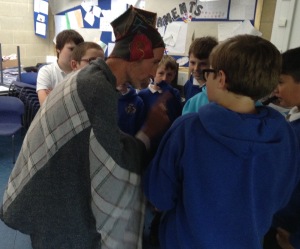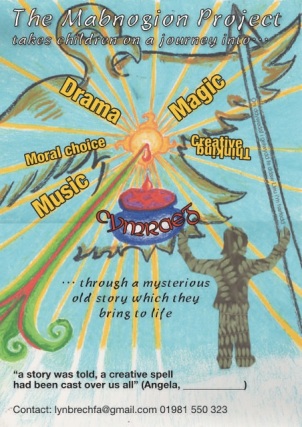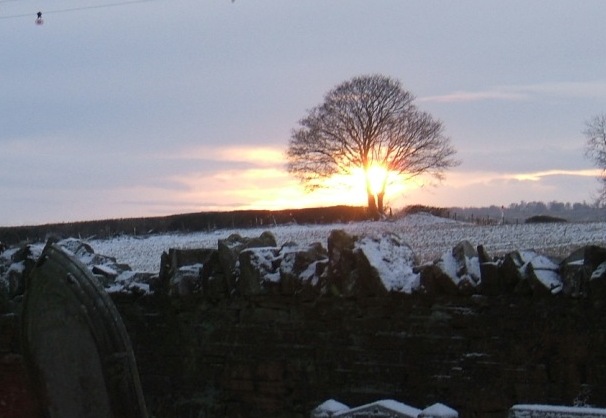
Yesterday Wayland and I did our Mabinogion workshop again, at a rural primary school near Hay in Wales. We tell the children we have been sent by the Children of Don from our hiding place in the hollow hills to show them what real magic is. It’s not a lie: Wayland and I share an obsession with a particular story from this collection of old British tales, written down in Welsh in the middle ages. We do the workshop in English with some Welsh thrown in, especially for spells and charms. The children get to curse and bless, find out about the four magical ‘Hallows’ which the Plant Don brought to Britain and then use them. They get to participate in an act of magical creation: making a woman of flowers from nothing, to make music, dance, become ‘servants of the invisible’. They charm the boy-turned-eagle down the tree and turn him back into a human,
Every time we do the workshops, the children (9,10 years old) tell us how much they loved it, and we are always impressed by their understanding of what magic really is, an understanding which disappears in ninety percent of adults. I always come away feeling inspired and enthused by the kids and their terrific boldness and brio – and puzzled and sorry that most of us lose these qualities as we grow up.

About 25 years ago I was at a party in London, a party I didn’t really want to be at, and I wandered out into the garden with my glass, to waste some time before I could politely leave. At the bottom of the garden was a fountain and a boy of about ten, idly kicking a deflated football at it. United in boredom, we started to chat and the boy poured out his heart to me: his mum and dad were separated and he had just been living for a while with his dad in Germany. Did he mind? Not too much, but there was one thing upsetting him: his dad was a scientist while this lad was a lover of magic, magic in all its forms, from stage magic to stories and ‘the real thing’. His dad had told him he was now of an age when he had to choose: science or magic, he couldn’t have both. He didn’t know which to choose.
‘Listen, I said, I promise you don’t have to choose! In fact it’s very important that you don’t, that you become one of those people, like me, who goes on believing in magic when they grow up. You can still do science if you want, no problem.’ ‘Really?’ he asked. ‘Yes!’ I said ‘and anyway magic isn’t what your dad thinks it is. You’ll find out that as you grow up, as long as you don’t let go of it’.
When I think of that boy now, as I often do, a man in his thirties, I wonder whether he did stay loyal to magic, or whether he was sucked into the orthodoxies of our scientistic world.
By now you’re asking: what is ‘real’ magic then? This is tricky. In the workshop we say we can’t put it into words because that would destroy it, that we can only show it.
So…I knew a man once who practised the most refined and subtle forms of magic. He understood the building blocks of creation. I think he was ‘enlightened’ if that means anything to you. I spent many hours in his kitchen talking to him and being shown strange models and diagrams. I need to add that this man was utterly unpretentious and had no wish for power or riches. He was a man of wisdom and knowledge – and magic.
Here is one of the things which he knew how to do: he could slip things into your being which you neither grasped nor understood at the time, but later on, maybe much later on, they would bob up to the surface and you would suddenly find a vista of new perceptions opening up. Now that he is some years dead, I find there is a quiet place outside of time where many of the moments he created still live and have their numinous power to shift me onwards and outwards – or inwards.
For me this is the real magic, subtle, infinitely skilful, as precise as any science, based on an understanding that forcefulness is never the way, that creation and expansion happen when this invisible ‘third force’ is seen and allowed to manifest. What is the ‘third force?’ Some would call it consciousness, some the ‘Holy Spirit’, some wouldn’t want to name it.
When the dancers drop their veils and little Blodeuwedd emerges in her flowered wedding dress; when her betrayed partner Lleu, in his feathered cloak, takes the last step down from the oak tree, to be turned by love into a boy again, when, at the end of the session, the ten years olds are clustering round us wanting to talk in Welsh, the old tongue… then we see what magic is and does. And how it brings us home to what we really are.

To find out about a course in real magic, go to this Facebook Page or follow @enchantersweb on Twitter
Great article Lyn! I’m so glad you and Wayland are doing this!
Reblogged this on Singing Head and commented:
My friends Lyn and Wayland, educating children in real magic!
Reblogged this on msamba.
Thanks, Rod, and MSamba/Anthony – it was the kids inspired me – they really give you hope for the human race.
But….Science *is* magic? Three hundred years ago (my field of interest) if I’d said to someone I was writing letters without a pen, without paper, to people I had never met, a thousand miles away – that would be magic to them. The idea that people can be invisible or travel in time is magic to us, but in a thousand years who knows? The world is a magical place for scientists too.
It really is such a privilege to engage with the brightness of children on a subject that so easily becomes murky and confused in an adult scenario. Their doing is direct and enthusiastic and their dreaming equally powerful. I think it’s a balance that adults lose touch with. It reminds me of the Philip Pullman story (His dark materials trilogy) in which children are being separated from their magical creatures.